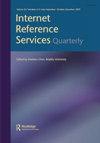How Important is Communication Style in Chat Reference?
Q3 Social Sciences
引用次数: 8
Abstract
Abstract Chat operators sometimes struggle to find a communication style that balances approachability and warmth with professionalism and authority. Both formal and informal communication styles have benefits and drawbacks that may affect patron satisfaction. Consequently, it may be difficult for chat operators to decide how to communicate with users, and for chat service managers to decide if communication style should be part of a service’s training and policies. This article reports on a study of chat transcripts from a collaborative chat reference service in Ontario, Canada. We compared operator communication style with users’ willingness to return, and included user and query type as moderating variables. The study used two samples: 299 randomly selected interactions and 217 interactions with negative or neutral exit survey responses. Chi square tests of independence showed a significant relationship between communication style and willingness to return in the dissatisfied sample, but not the random sample. There was a significant relationship between informality and willingness to return for faculty members and for research questions but only in the dissatisfied sample. We conclude that an operator’s choice to communicate either more formally or informally will not make users more satisfied, but it can help avoid leaving them dissatisfied, especially for faculty members and during research-intensive questions.交流风格在聊天中有多重要?
聊天操作员有时很难找到一种沟通风格,以平衡平易近人和温暖与专业和权威。正式和非正式的沟通方式各有利弊,可能会影响顾客的满意度。因此,聊天运营商很难决定如何与用户沟通,而聊天服务管理人员也很难决定沟通方式是否应该成为服务培训和政策的一部分。本文报告了对来自加拿大安大略省协作聊天参考服务的聊天记录的研究。我们比较了操作员的沟通方式与用户的回访意愿,并将用户和查询类型作为调节变量。该研究使用了两个样本:299个随机选择的互动和217个负面或中性退出调查反应的互动。独立性卡方检验显示,在不满意的样本中,沟通方式与回归意愿之间存在显著关系,而在随机样本中则没有。对于教师和研究问题,非正式性和返回意愿之间存在显著关系,但仅在不满意的样本中存在。我们得出的结论是,运营商选择更正式或非正式的沟通方式不会让用户更满意,但它可以帮助避免让用户不满意,特别是对于教职员工和研究密集型问题。
本文章由计算机程序翻译,如有差异,请以英文原文为准。
求助全文
约1分钟内获得全文
求助全文
来源期刊

Internet Reference Services Quarterly
Social Sciences-Library and Information Sciences
CiteScore
2.40
自引率
0.00%
发文量
13
期刊介绍:
Internet Reference Services Quarterly tackles the tough job of keeping librarians up to date with the latest developments in Internet referencing and librarianship. This peer-reviewed quarterly journal is designed to function as a comprehensive information source librarians can turn to and count on for keeping up-to-date on emerging technological innovations, while emphasizing theoretical, research, and practical applications of Internet-related information services, sources, and resources. Librarians from any size or type of library in any discipline get the knowledge needed on how to best improve service through one of the most powerful reference tools available on the Internet.
 求助内容:
求助内容: 应助结果提醒方式:
应助结果提醒方式:


